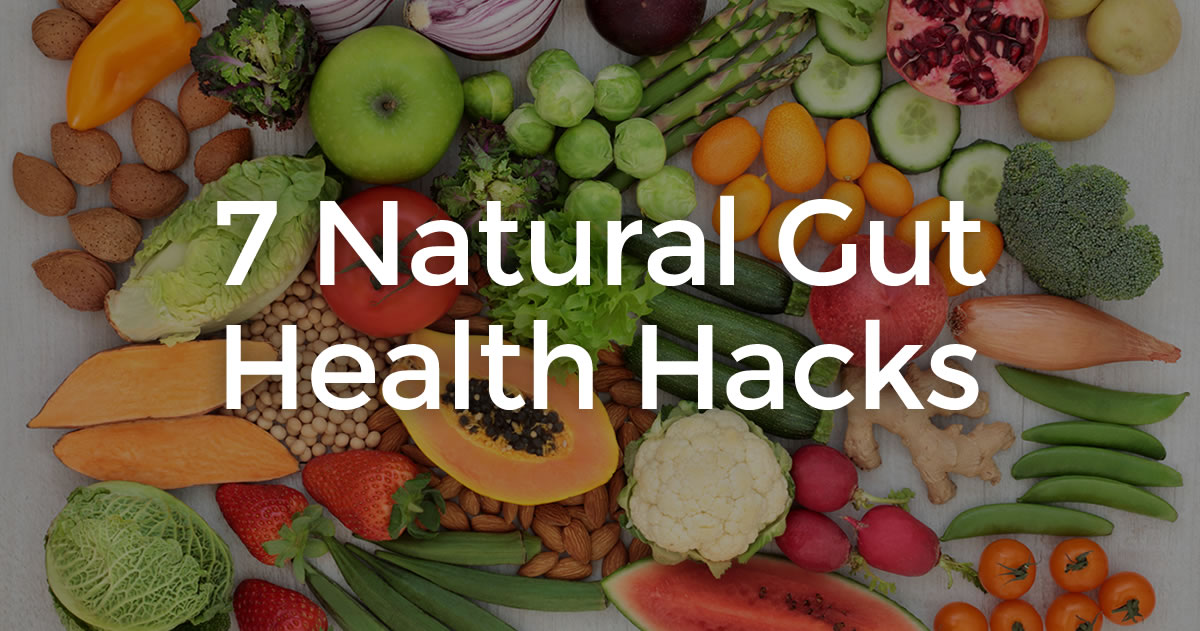Have you ever wondered what you can do to get rid of that pesky stomach ache or bloated feeling?
If so, you’re in luck. Today, we’re highlighting some helpful tips that can treat common digestive problems.
Keep reading to discover 7 natural hacks that can boost your gut health.

7 Natural Gut Health Hacks
1) Drink Water in the Morning
Drinking water in the morning, especially before eating, can improve your digestion. Water helps break down the food you eat, which allows your body to absorb key nutrients. Drinking water also softens stools and can prevent constipation.
What’s more, drinking water before meals can help you feel fuller and avoid overeating.
Don’t limit your water consumption to one part of the day, though! Sipping water throughout the day can keep you hydrated and support optimal digestion.
2) Chew Your Food Slowly
Chewing your food is the first part of the digestive process. Chewing slowly promotes the breakdown of food into tiny particles. This makes it easier for your body to absorb the nutrients in food.
The production of saliva during chewing also signals the upper muscle in your stomach to relax. This allows food to enter your stomach more easily.
Interestingly, one study found that chewing your food slowly can satisfy hunger cravings and reduce food consumption between meals.
But that’s not all. Chewing your food slowly can also prevent you from swallowing excess air. This is a common cause of bloating.
3) Drink Herbal Teas
Drinking herbal teas such as peppermint, chamomile, and ginger can treat many digestive symptoms and conditions.
Peppermint oil is a natural treatment for:
- Irritable bowel syndrome (IBS)
- Functional dyspepsia
- Childhood functional abdominal pain
- Post-operative nausea
Peppermint oil relaxes the smooth muscle in the gastrointestinal tract, reduces visceral pain, inhibits the growth of pathogens, and prevents gut inflammation.
Chamomile can treat symptoms of inflammatory bowel disease (IBD). In fact, combining chamomile with myrrh and coffee charcoal can extend the remission phase in people with ulcerative colitis. Research shows this herbal blend is just as effective as the drug mesalazine.
Ginger is a popular treatment for:
- Nausea
- Heartburn
- Flatulence
- Diarrhea
- Loss of appetite
Incredibly, ginger has anti-inflammatory, antioxidant, and anticancer properties that may also reduce the risk of gastrointestinal cancers. Studies show that ginger prevents the growth and spread of cancer cells in liver cancer, pancreatic cancer, colorectal cancer, and gastric cancer.
4) Consume Fruit by Itself
Consuming fruit by itself at least an hour before or after a meal can aid digestion and provide your body with a quick source of energy and nutrients. This is because fruit is the fastest digesting food.
Eating fruit with slow-digesting foods such as starches and proteins can slow down the digestive process. This can lead to uncomfortable symptoms such as bloating, indigestion, and flatulence.
However, you can still enjoy fruit with other foods on occasion. Green leafy vegetables also digest more quickly and can be eaten with fruit without any side effects. Being mindful of your food combination choices may help alleviate digestive problems.
5) Eat Fiber-Rich Foods
Eating fiber-rich foods can naturally boost your gut health. Fiber is the indigestible plant material found in fruit, vegetables, legumes, grains, nuts, and seeds.
Fiber bulks up stools and makes them easier to pass. This can normalize bowel movements and prevent both constipation and diarrhea. Adding more fiber-rich foods to your diet can also reduce your risk of the following:
- Diverticulitis
- Hemorrhoids
- Gallstones
- Kidney stones
- Colon cancer
- Acid reflux
- Ulcers
6) Ditch Junk Food
Junk foods such as soft drinks are often filled with high fructose corn syrup (HFCS), an artificial sugar made from corn syrup. HFCS contains unnaturally high levels of fructose that cause a stress response within the body and reduce insulin signaling in the liver.
Eating foods with HFCS can increase your risk of fatty liver disease, type 2 diabetes, and obesity.
Additionally, junk foods usually lack fiber and other important nutrients. Eating too much junk food can lead to hard stools that are difficult to pass. Opting for whole, plant-based foods over junk foods can improve your digestion.
7) Stay Physically Active
Staying physically active has protective effects against chronic inflammatory diseases. Recent research shows that aerobic exercise can increase the diversity of healthy bacteria in the gut, which can benefit both gut and brain health.
Remarkably, aerobic exercise can reduce symptoms of IBS while also lowering levels of anxiety and depression.
Regular physical activity can also increase intestinal motility and regulate bowel movements.
When to See a Gastroenterologist in Lubbock, TX
Sometimes, digestive problems need more specialized help than natural treatments can provide on their own. If you’re struggling with chronic digestive issues, you should see a gastroenterologist to find the root cause of your problem. You can call our office at 806-696-4440 or schedule an appointment online.
